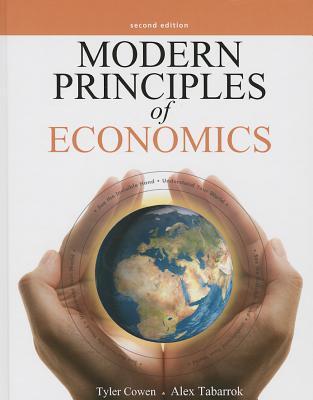What do you think?
Rate this book


Check out preview content for Modern Principles of Economics here.
From the authors:
See the Invisible Hand. Understand Your World. That's the tagline of Modern Principles and our teaching philosophy. Nobel laureate Vernon Smith put it this way:
At the heart of economics is a scientific mystery… a scientific mystery as deep, fundamental and inspiring as that of the expanding universe or the forces that bind matter… How is order produced from freedom of choice?
We want students to be inspired by this mystery and by how economists have begun to solve it. Thus, we show how markets interconnect and respond in surprising ways to changes in resources and preferences.
Consider, for example, how markets respond to a reduction in the supply of oil. Of course, the price of oil increases giving consumers an incentive to use less and suppliers an incentive to discover more. But an increase in the price of oil also encourages Brazilian sugar cane farmers to devote more of their production to ethanol and less to sugar thereby driving up the price of sugar. An increase in the price of sugar means a reduction in the quantity of candy demanded. So one way the market responds to a reduction in the supply of oil is by encouraging consumers to eat less candy! In analyses like this, we teach students to see the invisible hand and in so doing to understand their world.
Similarly, we offer a unique and simple proof of the amazing invisible hand theorem that without any central direction competitive markets allocate production across firms in a way that minimizes aggregate costs!
To understand their world students must understand when self-interest promotes the social interest and when it does not. Thus, Modern Principles has in-depth analyses of externalities, public goods, and ethical issues with market incomes and trade. Moreover, we always discuss economic theory in the context of real world problems such as the decline of the ocean fisheries, climate change, and the shortage of human organs for transplant.
794 pages, Hardcover
First published November 15, 2007
Bell-bottom jeans insist on coming back every few years, and their ugliness creates external costs for all who see them. Therefore, bell-bottom jeans should be taxed heavily.